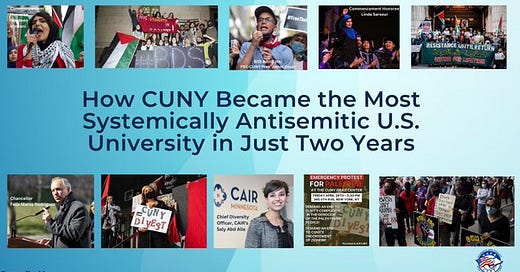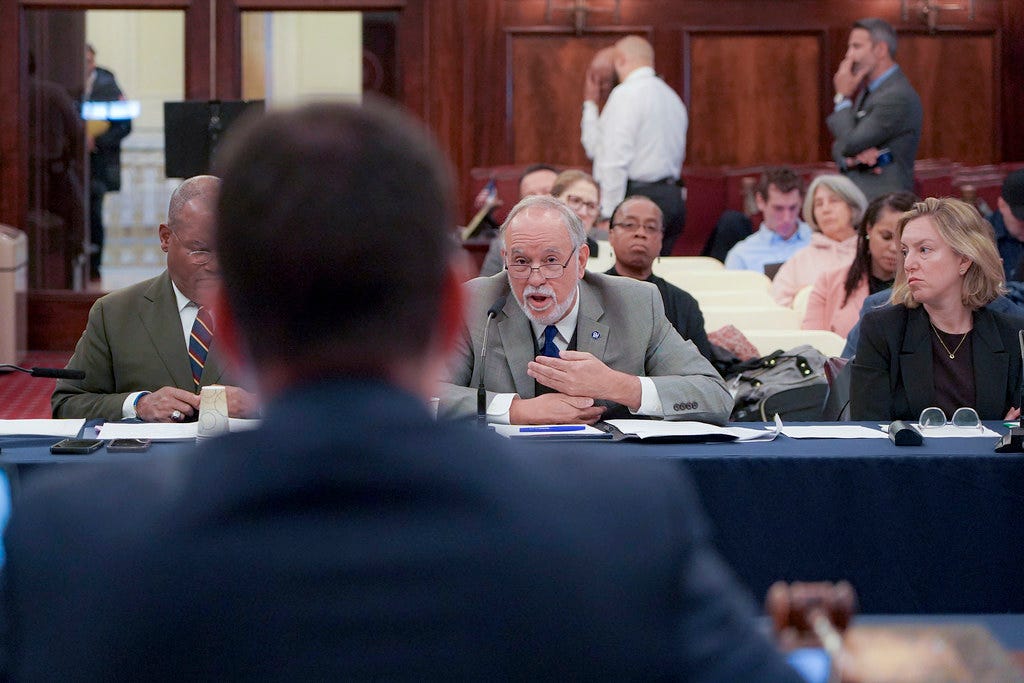📚CUNY's $3 Billion Question: When Did Antisemitism Become Academic Policy?
From Hitler Apologists to Hamas Sympathizers: How NYC's Largest Public University Lost Its Way
An institution that claims to search for truth while systematically avoiding uncomfortable facts has become nothing more than an expensive exercise in self-deception." Jordan Peterson (synthesized)
In the labyrinthine corridors of New York's public higher education system, a disturbing pattern has emerged that would make Kafka proud: institutional paralysis in the face of escalating antisemitism. The City University of New York (CUNY), the recipient of a cool $3 billion in public funds, finds itself at the epicenter of a crisis that its leadership seems pathologically unwilling—or unable—to address.
Chancellor Félix V. Matos Rodríguez's recent performance at the City Council hearing wasn't just disappointing; it was a masterclass in bureaucratic evasion that would make a Pentagon spokesman blush. When confronted with basic questions about the institution's response to antisemitic incidents, Rodríguez deployed that time-honored administrative shield: blame the "polarizing environment" and social media—as if Twitter somehow forced CUNY to ignore Hitler apologists in its student body.
The institution that once prided itself as New York's great engine of social mobility has become an incubator for something far more insidious. Consider the trajectory of Nerdeen Kiswani, whose decade-long presence at CUNY culminated in a 2022 commencement speech that turned what should have been a celebration of academic achievement into a political powder keg. Her evolution from student activist to what critics call the "Legal Jihad Godmother" represents not just an individual's radicalization but a systemic failure of institutional oversight.
The numbers tell their own damning story: Nearly a billion dollars in city funding, over two billion from the state, and yet when Councilwoman Julie Menin pressed for "rudimentary" information about the university's response to antisemitic incidents, the administration's cupboard was conspicuously bare. In the world of public administration, this level of unpreparedness isn't just negligence—it's negligence with a PhD.
Councilwoman Inna Vernikov's questioning about a John Jay student's social media post calling for "Hitler again" produced what might be the year's most tone-deaf response. The Chancellor's retreat into vague platitudes about "taking action" would be comical if it weren't so tragically inadequate. When administrators can't provide concrete examples of their response to explicit calls for genocide, we've moved beyond institutional failure into the realm of moral abdication.
The irony of CUNY's predicament is as rich as it is disturbing. An institution founded on principles of accessible education and social advancement now finds itself struggling to ensure basic safety for Jewish students. The viral videos of protesters taunting Jewish students about Hamas hostages aren't just incidents of hate—they're symptoms of a deeper institutional malaise that no amount of administrative handwringing seems able to cure.
Committee on Higher Education chair Eric Dinowitz's rebuke cuts to the heart of the matter: you can't manage what you won't measure, and you can't solve problems you refuse to acknowledge. CUNY's leadership has mastered the art of showing up without showing accountability, of being present without being prepared.
As we watch this drama unfold, one can't help but wonder: at what point does institutional inertia become institutional complicity? The incoming administration's threats to defund campuses that fail to address antisemitism might seem draconian to some, but in the face of such spectacular administrative failure, perhaps it's time for some draconian solutions.
The tragedy of CUNY isn't just in the incidents themselves—it's in the institution's seeming inability to rise to the moment. In an era where higher education should be leading conversations about tolerance and understanding, CUNY's leadership appears content to hide behind bureaucratic machinery while their students navigate an increasingly hostile environment.
For an institution that receives over three billion dollars in public funds, "we're working on it" isn't just an insufficient answer—it's an insult to the taxpayers who fund it and the students who depend on it. The question now isn't whether CUNY will change, but whether that change will come from within or be forced upon it from without.
In the meantime, Jewish students at CUNY might be forgiven for feeling like their safety is worth less than the paper their tuition checks are printed on. Welcome to the modern academy, where accountability is optional and leadership is an abstract concept best discussed in theory, never in practice.
🔍 Deep Dives & Dark Corners Uncovering the stories they don't want you to read






